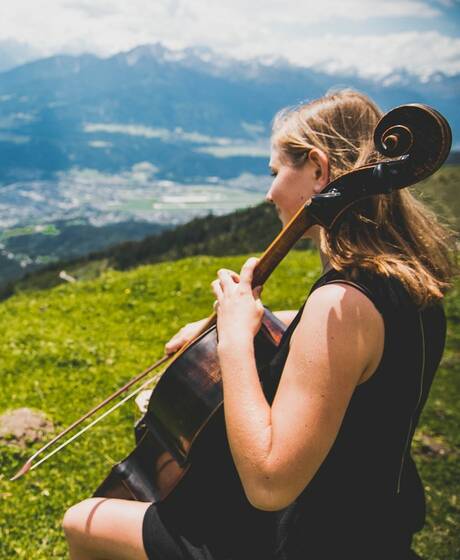Listening in the Mountains

The musicologist Marcus Zagorski writes about various aspects of listening to music in the mountains and nature.
A concert in the mountains provides an opportunity to listen in new ways, and to listen to more than the music being performed. But recreation in the mountains is a relatively new idea. For much of the past two thousand years, the Alps were not a place for leisure, but a place of terrible danger: the home of demons and witches as well as wolves and bears. Fantastic ideas about unknown mountain wilderness were overcome in only the last few hundred years. As recently as the eighteenth century, the Swiss naturalist and professor of physics in Zürich, Johann Jacob Scheuchzer, claimed that the large number of caves in the Graubünden, for example, made it likely that one would «find dragons there.»
But while some feared the Alps, others revered them. Before Christian missionaries came to warn of demons and dragons, the Celts saw the summits as the home of gods (a belief that recalls the ancient Greeks’ view of Mount Olympos as the dwelling place of Zeus). Reverence for mountain wilderness was stifled during the Christian period, but gradually returned as the Age of Enlightenment dispelled superstition and brought a renewed appreciation for the value of nature. Subsequently, some Romantic thinkers embraced the natural world as their faith and church. The English writer and art critic John Ruskin frequently came to the Alps to heal his spirit. He considered mountains as «great cathedrals of earth, with their gates of rock [...], choirs of stream and stone, [and] altars of snow.»
Those «choirs of stream and stone» that Ruskin heard have been heard by others, and still sing today for those who care to listen. The poet William Wordsworth, for example, crossed the Simplon Pass as a young man and was moved to memorialize the sounds he heard in a poem that would occupy the rest of his life: «The Prelude». Therein he wrote of «The rocks that muttered close upon our ears, / Black drizzling crags that spake by the wayside / As if a voice were in them [...]» And I myself, though I am no Wordsworth, have heard that same voice. It sang to me from a mountain stream
in California, in a moment of insight and understanding that was one of the most magical experiences of my life. As I listened to the voice of the stony stream, I was transformed. I was transformed by a kind of wilderness that still contains some of the mystery and wonder that has escaped the rationalization of our modern world. That is one reason why we should go to the mountains to listen.
Time spent in the mountains removes us from the noise and commotion of the cities in which most of us spend our lives. And a place removed from noise and commotion is an ideal place to listen to music. Mountain spaces offer an escape from a world in which our senses are dulled and our sensitivity to the wonders of the universe all but disappears. This escape is not into a world of fantasy, but into a more enduring reality: a reality that was here before us and will be here after us. In the same passage of the poem quoted above, Wordsworth made this connection: he found in the Alpine mountain pass «The types and symbols of Eternity, / Of first, and last, and midst, and without end».
Cities are indeed full of sound, but none of this sound has any meaning for us as we go about our day. We hear the riot of the passing traffic, the engines and tires, or horns and sirens, or mobile phones and conversations of other people; but because none of this conveys information that is immediately relevant to us as we walk to work or to lunch, we turn off our ears. We stop listening. In the mountains, by contrast, every sound conveys essential information and holds our attention. Mountain spaces teach us how to listen with care. And if we listen with care, we might better appreciate the
subtleties of the music we love.
When we return to our everyday lives, when we leave the hiking path and walk back to the city, or when the concert performance has ended, we may return refreshed and reinvigorated. We may return to ourselves with the awareness that there is another side of existence—and we know now how to listen for it. A concert in the mountains provides the opportunity to learn how to listen in new ways, to appreciate anew the extraordinary beauty and mystery of the universe. As we go about the lives we led before, we will find ourselves remembering time spent in the mountains, and we will recall how to listen and see with new senses.

